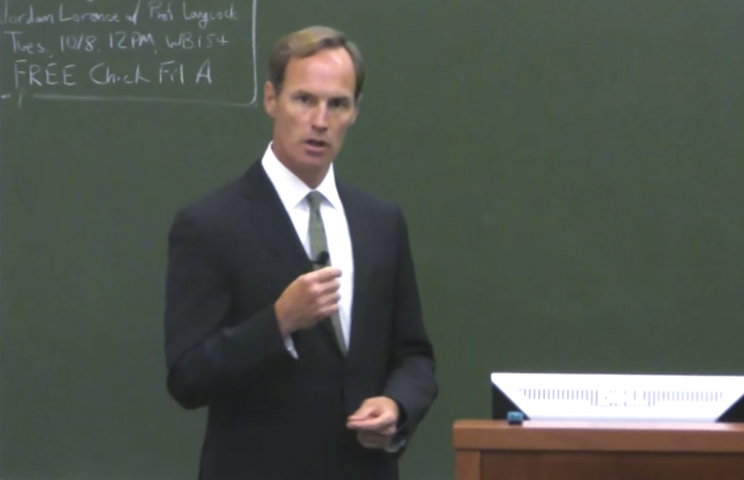How Jim Donovan got an edge on Wall Street as a Goldman Sachs banker

Longtime Goldman Sachs banker James “Jim” H. Donovan was asked by President Donald J. Trump to be deputy Treasury secretary.
Donovan, 50, is the latest Goldman alum tapped for the Trump administration. Others with ties to the investment bank include Treasury Secretary Steven Mnuchin, White House chief strategist Stephen Bannon, economic assistant Dina Powell, and chief economic advisor Gary Cohn, the bank’s former president and COO.
As No. 2 at the Treasury Department, Donovan will assist Mnuchin in carrying out the administration’s economic policies.
A Goldman Sachs archetype
Donovan graduated with his bachelor’s in chemical engineering from MIT. He received his MBA from MIT Sloan and his J.D. from Harvard Law School.
A former varsity rower at MIT, Donovan now runs 30 to 40 minutes per day, regardless of the weather outside or how little he’s slept the night before.
Donovan has a résumé made for Goldman. He joined the firm in 1993 and spent his entire career there, becoming a partner in 2000.
“I like to say I was lucky enough to get a job at Goldman Sachs and smart enough to take it,” he told University of Virginia law students in a lecture he gave in 2013.
At Goldman, he worked in investment banking, investment management, and corporate strategy. He’s best known for advising CEOs of large, multinational companies.
How Donovan locks down long-lasting relationships
His edge appears to be his ability to build and maintain lasting relationships with executives.
During that lecture at UVA, he shared a “common mistake” most bankers make when dealing with clients.
“If you’re a merger banker … you’ll be working with the CEO for six months or a year, very intensely,” he said. “You will spend all-nighters with the CEO. You’ll be sequestered in conference rooms. You’ll be on the phone or in person at all times, sharing their most intimate secrets about the firm. You get very close to that CEO in that process. And the typical good banker does that — they get very close to the CEO and do their best work.”
“The transaction gets consummated, they have a dinner — it’s called a closing dinner — and celebrate and some toasts are made. And the deal gets done, and the banker goes away go away until the next merger mandate, which might be six years later or 10 years later or maybe never.”
According to Donovan, the problem is during that time away the relationship between the banker and the CEO deteriorates. Sometimes a new CEO takes the helm, and the relationship is “toast.” That banker will have to get in line with 10 other firms competing in a “bake-off” for the next merger mandate. Instead, Donovan emphasized the importance of serving as a “strategic adviser” to the CEO since the company will be doing all sorts of financial transactions beyond M&A.
Instead, Donovan emphasized the importance of serving as a “strategic adviser” to the CEO since the company will be doing all sorts of financial transactions beyond just M&A.
“So, what I did was with my clients — when I started as a young associate at the firm — I did the best work I could on whatever mandate was in front of me; let’s say it was a merger mandate. But in those meetings, in those all-nighters, I started to engage the CEO other topics. ‘I read in the paper your competitors are doing this. How do you feel about that?…I noticed that you just purchased a company in Japan, are you interested in hedging your Japanese yen exposure? If so, I can help you put together a team to do that. In fact, I can put together a team and lead a team and help you do anything in the financial world.’ As the merger was going on, I was working on other things for the CEO. [After] the merger was completed, I kept working on other things. And so when there was a merger mandate that came up in six years, it wasn’t a matter of any bake-off occurring. It was, ‘I’m going to call Jim because I just got finished talking to him about something else.’”
Becoming a generalist and strategic adviser is what allowed Donovan to “box out” the competition. He added that it’s not innate, but it can be learned.
Donovan’s been involved in Republican politics
One of his clients was private equity firm Bain Capital, which was co-founded by Mitt Romney. Romney has been a friend of Donovan’s for more than 15 years.
A Republican, Donovan was an adviser and fundraiser for Romney’s presidential campaign. More recently, he helped raise money for Jeb Bush’s campaign during the Republican primaries.
Outside of work, Donovan focuses his philanthropic efforts on cancer-related causes. He serves on the Foundation for the National Institutes of Health Board of Directors and the Board of Trustees of the Dana-Farber Cancer Institute. He’s also a member of The Lank Center for Genitourinary Oncology. He and wife started the Christy and Jim Donovan Fund for Prostate Cancer Research at DFCI.
Donovan has been an adjunct professor at UVA’s law school.
“Jim Donovan has been teaching courses in our Law & Business Program for eight years, and during that time he has given our students unique and invaluable instruction in corporate strategy and client relations. We are fortunate to have him as a member of the UVA Law community and hope to have him back when he concludes his public service,” Lisa Goluboff, the dean of UVA’s law school, told Yahoo Finance in an emailed statement.
Donovan resides in Virginia with his wife, Christy, and their four children.
A spokesperson for Goldman didn’t respond to a request for comment.
—
Julia La Roche is a finance reporter at Yahoo Finance.
Read more:


